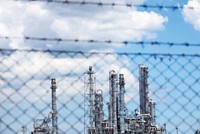Advertisement
Grab your lab coat. Let's get started
Welcome!
Welcome!
Create an account below to get 6 C&EN articles per month, receive newsletters and more - all free.
It seems this is your first time logging in online. Please enter the following information to continue.
As an ACS member you automatically get access to this site. All we need is few more details to create your reading experience.
Not you? Sign in with a different account.
Not you? Sign in with a different account.
ERROR 1
ERROR 1
ERROR 2
ERROR 2
ERROR 2
ERROR 2
ERROR 2
Password and Confirm password must match.
If you have an ACS member number, please enter it here so we can link this account to your membership. (optional)
ERROR 2
ACS values your privacy. By submitting your information, you are gaining access to C&EN and subscribing to our weekly newsletter. We use the information you provide to make your reading experience better, and we will never sell your data to third party members.
Policy
Plant Security
Congress grants DHS authority to develop chemical plant antiterrorism protections
by Jeff Johnson
October 2, 2006
| A version of this story appeared in
Volume 84, Issue 40
A stop-gap measure giving the Department of Homeland Security authority to develop and oversee a chemical plant security program was approved last week by House and Senate leaders.
The measure was attached to the DHS fiscal 2007 appropriations bill, which was expected to clear Congress late last week. The security provisions are far weaker than approaches in other bills debated since Sept. 11, 2001. Although stronger legislation cleared committees, no such bill reached the House or Senate floor.
The measure gives DHS near absolute authority over plant security, but that power ends in three years—enough time, congressional supporters say, to pass a comprehensive bill.
House and Senate Republicans heralded the measure as a step forward, and the American Chemistry Council said it was "not perfect but a fair compromise." However, several Senate Democrats and environmental groups said the provisions will simply allow DHS to rubber-stamp ACC's plant security program.
The provisions call for DHS within six months to issue interim chemical plant security regulations establishing "risk-based performance standards." Vulnerability assessments and security plans are required, but no standards are set. DHS is left to determine what companies are included and what they must do.
Security information will not be made public, and the decision to release information to state or local officials, including police and fire departments, is left to DHS. The measure is silent on inherently safer technology requirements, and it is unclear if state chemical plant security laws will be preempted by DHS's oversight.
The measure gives DHS enforcement authority but lacks standards for plant audits and inspections. Before DHS can order compliance, it must notify the company in writing and then consult with the company.



Join the conversation
Contact the reporter
Submit a Letter to the Editor for publication
Engage with us on Twitter